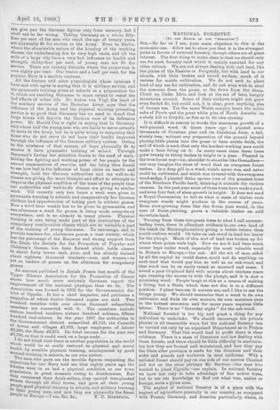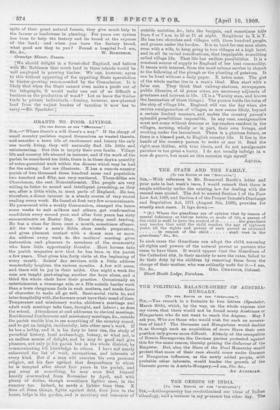NATIONAL FORESTRY.
[To THE EIATOtt Or TIM “SPX0rAT01103 SIR,—S0 far as I see, your main objection to this is the economic one. Allow me to show you that it is the strongest point in favour of national forestry, though others are of great interest. The first thing to make clear is that we should only use for such forestry laud which is mainly unsuited for any other culture. We are not always dealing with rich land, like the plains of the Datiube or Burgundy, but with land in our islands, with their broken and varied surface, much of it useless • for arable cultivation. We do not seek to plant land of any use for cultivation, and do not even wish to steal the common from the goose, or the down from the sheep.
Climb up Cadet. Idris, and look at the sea of bare, hungry mountains around. Some of their surfaces might not grow even Scotch fir, but could not, it is clear, grow anything else of human use. Yet the same Welsh country bears the noble oaks of Powis and the great white pine of North America on a shaly hill at Gwydir, as fine as in its own country.
It is difficult to convey in words the enormous growth of a well-planted. wood. A dozen years ago I planted some thousands of Corsican pine and its Calabrian form, a tall, stately tree, without any preparation of the ground beyond placing little plants into the grass or bare arable fields, the soil of which is such that only the hardest-working man could make a bare living on it. In many oases since these trees grew twenty to thirty inches in height in a year. Planted in the true forest way—i.e., shoulder to shoulder like Grenadiers— one may imagine the mass of wood that an evergreen forest makes. In a deep gill in a wood, which never was, and never could be, cultivated, and which was covered with the evergreen wood-sedge, I planted Sitka spruce (one of the greatest trees of the Northern Pacific land), thinking it suitable for various reasons. In the past year some of these trees have made a yard, and even four feet, of stem-growth in height. It does not need a Royal Commission to tell us what a mass of timber suoh evergreen woods might produce in the course of years. Even slow-growing trees like the Swiss pine would, in the case of State-planting, prove a valuable timber on cold monntain-land.
Turning from these evergreen trees to what I call summer- leafing trees, there is aguudant evidence in our own laud of the beech (in Buckinghamshire) giving a better return than arable culture would. Or take an oak-wood in land too heavy for the plough. Mueli of this sort of land was broken up for wheat when prices weft) high. Now we see it had been much better kept under wood, especially the most valuable wood in Britain or Europe,—the oak. All the wit of man, aided by all the capital he could desire, could not do anything. on such land that would pay him so well as an oak-wood, and that wood can be as easily raised as mustard and cress. I sowed a poor ill-placed field with acorns about thirteen years ago, running the Rooms in with the plough, and it is now a promising wood. People laugh at this as a means of making a living, but a State, which does not die, is in a different position. I plant because it amuses me, and I like to see the things young. We should remember that a wood is its own cultivator, and finds its own manure, its own moisture even in the hottest summers, and for many years requires little labour. There is no "Saturday night" for the oak-wood.
National forestry is too big and great is thing for any individual to undertake. We should encourage the private planter in all reasonable ways, but the national forestry can be carried out only by an organised Department as in France and Germany. That this would lead to profit there is clear evidence. There is a mass of literature and law dealing with these forests, and there should be little difficulty in ascertain- ing how they are formed and maintained, and how they pay the State after provision is made for the directors and their aides and guards and workmen in neat uniforms. Why national forest should pay on one side of our narrow Channel and not on the other perhaps Mr. Barbour—the man who wanted to plant Uganda—can explain. In national forestry we have not only to take advantage of fine native trees, but to use our knowledge to find out what tree, native or foreign, suits a given area. The neglect of national forestry is of a piece with the neglect of agriculture generally in our country, as compared with France, Germany, and America particularly, where, in
spite of their great. natural forests, they give much help to the farmer or landowner in planting. For years our system has been to help the factory and its brood at the expense of the land; and when you have the factory brood, what good are they to you ? Found a hospital P—I am, [We should delight in a forest-clad England, and believe with Mr. Robinson that much land in these islands would be well employed in growing timber. We can, however, agree to this without approving of the appalling State speculation in timber-growing recommended by the Commission. Is it likely that when the State cannot even make a profit out of the telegraphs, it would make one out of so difficult a business as the production of wood ? Let us leave the timber trade to private individuals,—freeing, however, new-planted land from the unjust burden of taxation it now has to carry.—ED. Spectator.]







































 Previous page
Previous page